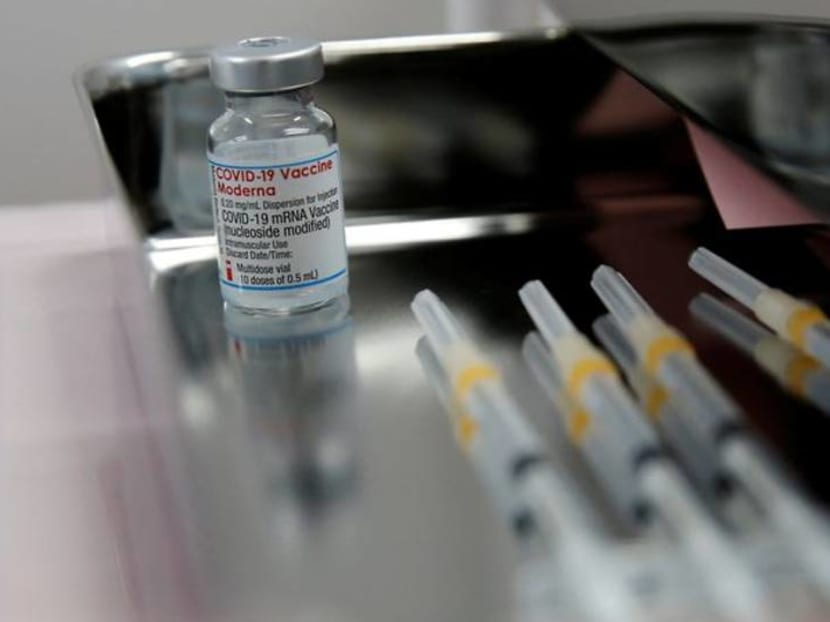Those with mild skin reactions after first COVID-19 jab now allowed to receive further doses: Expert committee

FILE PHOTO: A vial containing doses of the Moderna COVID-19 vaccine and syringes. (Photo: REUTERS/Kim Kyung-Hoon)
SINGAPORE: People who develop non-severe skin reactions after receiving the first dose of their mRNA COVID-19 jab will now be allowed to receive further doses of the same vaccine, said the Expert Committee on COVID-19 vaccination on Thursday (Sep 16).
Separately, people who have just received their jabs should also avoid strenuous physical activity for two weeks, instead of the one week that was previously recommended, the committee said.
The updated recommendations were made after a review of further vaccine safety data, it said.
The Pfizer-BioNTech and Moderna vaccines, which are approved for use in the national vaccination programme, use mRNA technology.
SKIN REACTIONS
People who showed mild or non-specific skin symptoms - such as itching without a rash, a red patch beyond the injection site or eczema - after the first dose of an mRNA vaccine were previously deemed ineligible for further doses.
The updated recommendation will allow more people, particularly those with minor or non-specific past reactions, to safely complete vaccination, said the committee.
This includes those who previously had non-severe skin reactions occurring more than four hours after the vaccination without other symptoms, as well as those who experienced a flare-up of skin conditions such as psoriasis or eczema.
“Persons with the above conditions are encouraged to return to their previous vaccination sites in order to be reassessed for eligibility to complete their vaccination.”
Skin reactions - such as rashes and hives - were among the most commonly reported adverse reactions from the use of Pfizer-BioNTech and Moderna vaccines, said the Health Sciences Authority (HSA) in its fifth COVID-19 vaccine safety update released on Thursday.
AVOID STRENUOUS ACTIVITY FOR 2 WEEKS AFTER JABS
The committee also said on Thursday that people - in particular adolescents and younger persons - should avoid strenuous exercise or physical activity for two weeks after their jabs, up from the one week that was previously recommended.
Local and overseas data “continue to show a small risk of developing myocarditis or pericarditis after mRNA COVID-19 vaccination”, it said, adding that such cases occur predominantly in younger people and after the second dose.
“While most of the cases reported previously had occurred within one week of vaccination, HSA had also started to receive reports of some cases that occurred within the second week of vaccination,” the committee said.
“Myocarditis and pericarditis after vaccination are rare, but occurrence tends to be higher in young males aged 30 years and below.”
Individuals are advised to seek prompt medical help if they develop chest pain, shortness of breath or palpitations during the two weeks after inoculation.
HSA said in its COVID-19 vaccine safety update that it has received 65 local reports of myocarditis and pericarditis as of end-August. Among the cases, 40 were below the age of 30, of which 36 were men.
The incidence rate after the second dose was 1.06 per 100,000 doses administered, the authority said. The incidence rate was higher among men below 30 years old, at 4.84 per 100,000 doses.
“Thus far, most local cases of vaccine-related myocarditis in the younger age group have been mild, responded well to treatment and are recovering or were discharged well from the hospital,” the committee said.
“This is consistent with what has been observed internationally.”
As of Wednesday, 81 per cent of Singapore's population have completed their full COVID-19 vaccine regimen, while 84 per cent have received at least one dose.
More than 8.88 million doses have been administered under the national vaccination programme, which uses the Pfizer-BioNTech and Moderna vaccines.
Another 179,086 doses of other vaccines recognised in the World Health Organization's emergency use listing have been administered, covering 86,731 people.
BOOKMARK THIS: Our comprehensive coverage of the COVID-19 pandemic and its developments
Download our app or subscribe to our Telegram channel for the latest updates on the coronavirus pandemic: https://cna.asia/telegram








